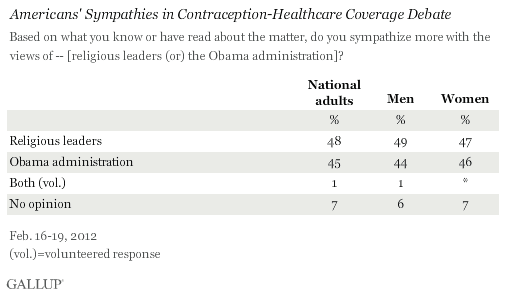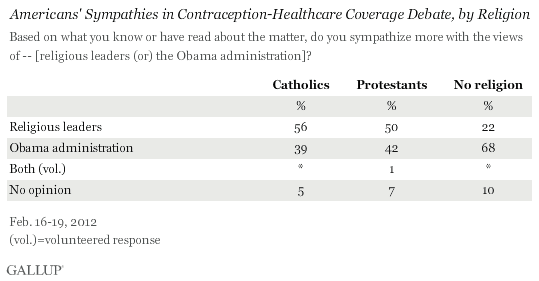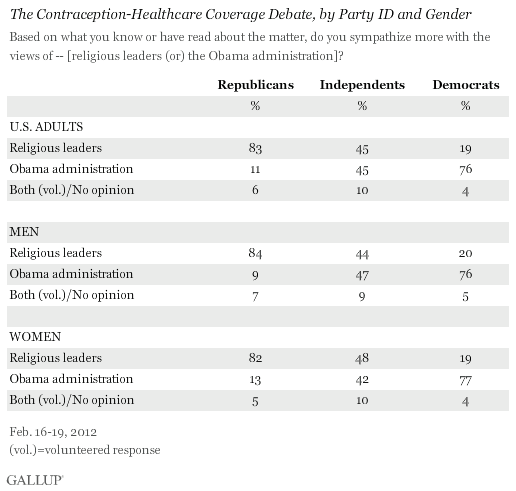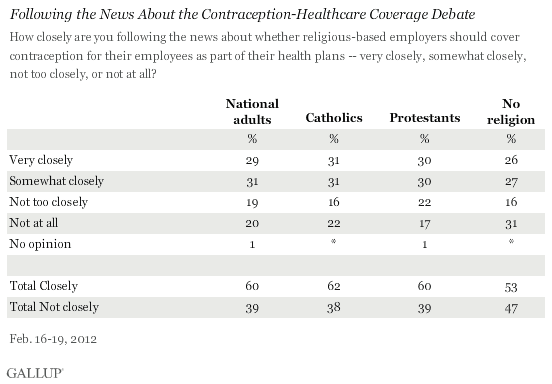PRINCETON, NJ -- Americans have paid fairly close attention to the news about whether religious-based employers should have to provide contraception coverage for employees as part of their health plans. When asked what they think about the issue, 48% of all Americans say they sympathize more with the views of religious leaders, while 45% sympathize more with the Obama administration. The views of men and women are nearly identical.

Catholics and Protestants Tend to Agree With Religious Leaders
The controversy centers on whether the new federal healthcare regulation requiring most employers to provide coverage for birth control violates the religious liberties of Catholic-affiliated hospitals, schools, and charities.
Despite the Catholic Church's official opposition to birth control and the resulting strong public opposition to the new regulation from Catholic bishops in the U.S., Gallup finds Catholics' views on the matter differing little from Protestants'. Half of Protestants and 56% of Catholics say they sympathize more with religious leaders on this issue, while about 4 in 10 adults in both groups side with the Obama administration.
The greater difference by religion is between the nonreligious and Christians overall. Nearly 7 in 10 (68%) of those with no religious affiliation side with the Obama administration; barely 2 in 10 support religious leaders.

Contraception Issue Separates the Major Parties; Divides Independents
There are also large partisan gaps in these attitudes. An overwhelming majority of Republicans (83%) sympathize more with the views of religious leaders, while nearly as high a percentage of Democrats (76%) sympathize more with the Obama administration. Importantly from a political perspective is that independents are evenly divided, at 45%.
The views of men and women within each party are fairly similar, with 82% of Republican women and 84% of Republican men siding with religious leaders. Similarly, about three-quarters of Democratic women and men sympathize with the Obama administration. Independent women and independent men are both closely divided.

Six in 10 Closely Following Contraception Issue
Sixty percent of Americans say they are following the news story very closely or somewhat closely, while 39% say they are following it not too closely or not at all. The 29% following the issue very closely is slightly higher than the 22%, on average, who have paid close attention to more than 200 news stories Gallup has measured in the past decade.
Catholics' attention to the story is similar to that of Protestants, but greater than that of the nonreligious.

Bottom Line
In the debate over requiring religious-affiliated institutions to provide contraception coverage for their employees, Americans' sympathies are closely divided between the views of religious leaders and the Obama administration. Christians -- Protestants and Catholics alike -- sympathize more with religious leaders, while nonreligious Americans side more solidly with the Obama administration. The issue elicits strong partisan differences, but not gender-related ones. Women and men largely share the same view. Independents, including independent women and independent men -- are closely divided in their sympathies toward the two perspectives.
Survey Methods
Results for this Gallup poll are based on telephone interviews conducted Feb. 16-19, 2012, with a random sample of 1,014 adults, aged 18 and older, living in all 50 U.S. states adn the District of Columbia.
For results based on the total sample of national adults, one can say with 95% confidence that the maximum margin of sampling error is ±4 percentage points.
For results based on the total sample of 249 Catholics, one can say with 95% confidence that the maximum margin of sampling error is ±7 percentage points.
Interviews are conducted with respondents on landline telephones and cellular phones, with interviews conducted in Spanish for respondents who are primarily Spanish-speaking. Each sample includes a minimum quota of 400 cell phone respondents and 600 landline respondents per 1,000 national adults, with additional minimum quotas among landline respondents by region. Landline telephone numbers are chosen at random among listed telephone numbers. Cell phone numbers are selected using random-digit-dial methods. Landline respondents are chosen at random within each household on the basis of which member had the most recent birthday.
Samples are weighted by gender, age, race, Hispanic ethnicity, education, region, adults in the household, and phone status (cell phone only/landline only/both, cell phone mostly, and having an unlisted landline number). Demographic weighting targets are based on the March 2011 Current Population Survey figures for the aged 18 and older non-institutionalized population living in U.S. telephone households. All reported margins of sampling error include the computed design effects for weighting and sample design.
In addition to sampling error, question wording and practical difficulties in conducting surveys can introduce error or bias into the findings of public opinion polls.
View methodology, full question results, and trend data.
For more details on Gallup's polling methodology, visit www.gallup.com.
